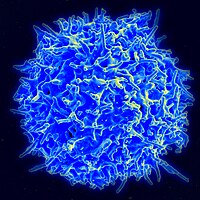
Photo from wikipedia
Abstract Background We previously found two distinct passenger dendritic cell (DC) subsets in the rat liver that played a central role in the liver transplant rejection. In addition, a tolerance-inducing… Click to show full abstract
Abstract Background We previously found two distinct passenger dendritic cell (DC) subsets in the rat liver that played a central role in the liver transplant rejection. In addition, a tolerance-inducing protocol, donor-specific transfusion (DST), triggered systemic polytopical production of depleting alloantibodies to donor class I MHC (MHCI) antigen (DST-antibodies). Methods We examined the role of DST-antibodies in the trafficking of graft DC subsets and the alloresponses in a rat model. We also examined an anti-donor class II MHC (MHCII) antibody that recognizes donor DCs more selectively. Results Preoperative transfer of DST-antibodies or DST pretreatment eliminated all passenger leukocytes, including both DC subsets and depleted the sessile DCs in the graft to ~20% of control. The CD172a+CD11b/c+ immunogenic subset was almost abolished. The intrahost direct or semi-direct allorecognition pathway was successfully blocked, leading to a significant suppression of the CD8+ T-cell response in the recipient lymphoid organs and the graft with delayed graft rejection. Anti-donor MHCII antibody had similar effects without temporary graft damage. Although DST pretreatment had a priming effect on the proliferative response of recipient regulatory T cells, DST-primed sera and the anti-donor MHCII antibody did not. Conclusion DST-antibodies and anti-donor MHCII antibodies could suppress the CD8+ T-cell-mediated liver transplant rejection by depleting donor immunogenic DCs, blocking the direct or semi-direct pathways of allorecognition. Donor MHCII-specific antibodies may be applicable as a selective suppressant of anti-donor immunity for clinical liver transplantation without the cellular damage of donor MHCII– graft cells and recipient cells.
Journal Title: International Immunology
Year Published: 2020
Link to full text (if available)
Share on Social Media: Sign Up to like & get
recommendations!